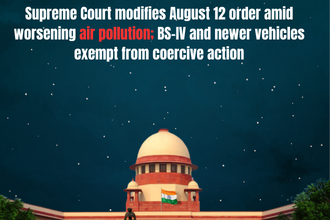In a significant ruling reinforcing the sanctity of lawyer-client confidentiality, the Supreme Court of India on Friday held that investigating agencies cannot summon lawyers merely because they have advised or represented an accused person. The judgment establishes firm procedural safeguards to prevent misuse of investigative powers and to protect the independence of the legal profession.
A Bench comprising Chief Justice of India (CJI) BR Gavai and Justices K Vinod Chandran and NV Anjaria ruled that advocates can be summoned only in exceptional cases specifically permitted under Section 132 of the Bharatiya Sakshya Adhiniyam, 2023 (BSA)—and even then, only with documented approval of a senior investigating officer.
Understanding the Legal Context
What Section 132 BSA Protects
Section 132 of the BSA is the statutory successor to Section 126 of the Indian Evidence Act, 1872. It preserves legal professional privilege, prohibiting lawyers from disclosing:
- Client communications
- Legal advice exchanged privately
- Information gained through professional representation
However, the section includes narrow exceptions, such as when:
- A client seeks legal advice to commit a crime, or
- A lawyer witnesses ongoing fraud or illegal acts.
The Supreme Court made it clear that only these exceptions may justify summoning a lawyer.
The Court’s Core Holding
The Court stated:
“Investigating officers shall not issue summons to lawyers appearing for the accused. Summons may be issued only if the case falls under one of the exceptions in Section 132, and such exception must be clearly recorded.”
This ensures transparency, judicial oversight, and protection against harassment of lawyers.
Key Directions Issued by the Supreme Court
| Direction | Implication |
|---|---|
| Lawyers cannot be summoned to disclose legal advice or strategy. | Protects confidentiality of professional communications. |
| Summons may be issued only when an exception under Section 132 is invoked, and must clearly state the grounds. | Prevents arbitrary or vague summons. |
| Summons must be approved by a superior officer not below Superintendent of Police (SP), who must record written satisfaction. | Adds an institutional check within investigating agencies. |
| Such summons may be challenged through judicial review under Section 528 BNSS. | Protects against misuse through court oversight. |
| If digital devices of lawyers are seized, they may only be examined in the presence of the advocate, with privacy of other client data protected. | Safeguards multi-client confidential datasets. |
| In-house counsel do not receive Section 132 privilege, but may receive limited protection under Section 134 BSA. | Distinguishes courtroom advocates from corporate legal departments. |
The privacy of all other clients represented by the lawyer must not be compromised during search or inspection of electronic devices. This recognizes how modern legal practice involves sensitive digital data.
Why This Case Arose: ED’s Summons to Senior Lawyers
The Supreme Court initiated the matter suo motu after media reports emerged that the Enforcement Directorate (ED) had summoned:
- Senior Advocate Arvind Datar, and
- Advocate-on-Record Pratap Venugopal
in connection with an investigation into ESOPs issued by Care Health Insurance to former Religare Enterprises Chairperson Rashmi Saluja, valued at over ₹250 crore.
Datar had provided a legal opinion, while Venugopal was appearing as counsel in related proceedings. After sharp criticism from bar associations nationwide, the ED withdrew the summons.
During the hearings:
- Attorney General R Venkataramani acknowledged that the ED’s action was improper.
- Solicitor General Tushar Mehta stated that lawyers cannot be summoned simply for providing legal advice, though he cautioned against assuming malice in every investigative action.
The bench also remarked on concerns of investigating agencies being active in politically sensitive cases, but refrained from generalizing, stating the need for balance between investigation and legal independence.
Significance of the Judgment
1. Reinforces Lawyer-Client Privilege
The decision upholds free and fearless legal consultation—a cornerstone of the justice system. Without confidentiality, clients may hesitate to speak openly, weakening their right to defense.
2. Checks Investigative Overreach
By requiring higher-level approval and recorded reasons, the ruling makes sure that summoning advocates does not become a tool of pressure or coercion.
3. Clarifies Status of In-House Counsel
The Court drew a clear distinction:
| Type of Lawyer | Privilege Available? | Notes |
|---|---|---|
| Court-practicing Advocate | ✅ Full privilege under Section 132 | Covers litigation and advisory work. |
| In-House Counsel | ⚠️ Limited protection under Section 134 | No privilege for employer communications; privilege applies only to legal advice role. |
This aligns Indian law more closely with common law privilege doctrines.
4. Aligns Evidence Law with BNSS Procedures
The Court emphasized harmony between:
- Section 132 BSA (privilege)
- Section 94 BNSS (search and seizure)
- Section 528 BNSS (judicial review)
This ensures consistent procedural safeguards across the new criminal law framework.
Impact on Legal Practice
This ruling provides reassurance to the legal community that:
- Lawyers cannot be targeted for defending clients.
- Investigating agencies must respect professional independence.
- Legal advice remains protected intellectual work, except when misused to commit crimes.
This ensures that criminal defense remains robust, preventing a chilling effect where lawyers fear reprisal for representing unpopular clients.
Conclusion
The Supreme Court’s ruling marks a critical affirmation of legal ethics, constitutional rights, and professional autonomy. By reinforcing the confidentiality of lawyer-client relationships and placing structured checks on investigative powers, the Court has strengthened procedural fairness and protected the integrity of the justice system.
The judgment will influence how ED, CBI, police, and regulatory bodies interact with legal professionals across the country. It also sets a precedent for judicial oversight, ensuring that law enforcement remains powerful but not unrestrained.
Also Read
Can Rape Case on False Promise to Marry Be Settled Amicably? Supreme Court Says Yes


